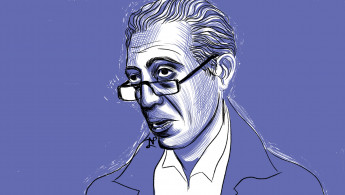Abdul Rahman Munif's legacy becomes a victim of war
Even writing the question pained the wife of the Jordanian-born Saudi novelist who left a lasting impact on Arabic literature.
"Just because he does not have a citizenship, would he turn into nobody?"
City of pain
Qawadiri's post on Facebook comes after the library built by the author of the seminal work of contemporary Arabic literature, Cities of Salt, was ransacked and vandalised in Damascus, the city he was to spend his final years until he died in 2004.
Munif's library contained more than 15,000 books, including encyclopedias, dictionaries, periodicals and journals from times ancient and modern. It was rich with literature on authentic Arab heritage and the region's culture, as well as other rare and first editions of texts no longer in publication.
Qawadiri accused Hamza Barqawi, the secretary of the General Union of Palestinian Writers and Journalists, and his son, Sami, of "destroying, damaging and vandalising" the library.
Sami Barqawi has vehemently denied the accusations.
She says she hosted Sami when his own home in Harasta, in the Damascus countryside, was destroyed in the war, and offered him and his wife shelter and assistance.
"I made the mistake of my life," she said. "What I did contributed to the loss and looting of Munif's heritage and his library. That horrible mistake will remain in my memory forever.
"They were unfaithful," she continued. "Hamza's family and his wife Majida Shaker vandalised the library and the entire heritage of the novelist."
Speaking to al-Araby al-Jadeed by phone, Qawadiri said she was about to visit her children in the United States and Dubai when Sami's house was shelled.
"Since we were good friends, I said it was okay for them to stay at my place until I came back. I did not charge them of course."
She had placed the most valuable manuscripts and books in a safe, but she says Barqawi asked for the keys before she left, under the pretext that the security situation was unstable and it was better to keep the keys with him.
| I made the mistake of my life - what I did contributed to the loss and looting of Munif's heritage. - Souad Qawdiri, Latif's wife |
"Nine months later I came back home. Everything was out of place. I thought the library was the way it was because they did not take care of it. I was very annoyed and because it was winter time, I did not organise it. The house is very big so it took me sometime before I organised it and discovered what happened," Qadiri said.
She expressed surprise at how Sami is alleged to have managed to take photos of the library's collection.
"I know this is very costly so I do not think it was done by one person," she said.
She claimed she discovered Sami was behind the ransacking, as his name was allegedly written on the request sent for repackaging the books after the library was destroyed. He apparently forgot to remove his name.
Lost heritage
Other discrepancies were noted in the library.
"I had also secured a number of pages each of Munif’s diaries, but I found out that many of the pages were missing. I am very worried that they might have taken out pages of his diaries to distort the facts and add whatever they wanted to them," she pointed out.
Not only that, she continued, but she fears the intellectual copyright of Munif's books and novels might have been violated. "He took out some covers and fiddled with other publications," she alleged.
With many original manuscripts and books missing, Munif's library was left as a "dirty, deserted and distorted place". Munif's letters exchanged with his friends, which Qawadiri was planning to publish, were also reportedly missing.
"His personal documents, writings, manuscripts, and drawings from him and some great painters were also stolen. What is more striking is that they even stole manuscripts that are yet to be published and some incomplete chapters of novels which Munif did not finish."
But why has Qawadiri waited for so long to disclose what had happened?
She said she relied on mutual friends to resolve the issue, but Sami denied the accusations and claimed that she made the story up. "Why are you making a big deal out of it?" Qawadiri claimed Sami asked her.
"I talked to a lawyer and he said that in times of war, vandalising a library, or any other cultural crime, would not be taken seriously. He thought that taking the matter to court would not be useful."
Al-Araby al-Jadeed contacted Sami Barqawi who said "the recent remarks by Qadiri are fabrications and lies and baseless".
"I stayed at her house for nine months given the long relations between our families, relations that date back over 50 years. But she later said she allowed me to stay because she felt pity for me," he said.
Why would she fabricate what had happened given the strong friendship between their families?
"I do not know who pushed her to do so. How could a huge theft be discovered one year later? She spoke about stealing and damaging over 15,000 books. Anyone in her shoes would not have waited and resorted to justice immediately," he said.
"She only wanted to slander and offend my family for reasons we are unable to explain. Maybe she just wanted to build her husband's glory by defaming other people's reputation."
This article is an edited translation from our Arabic edition.



